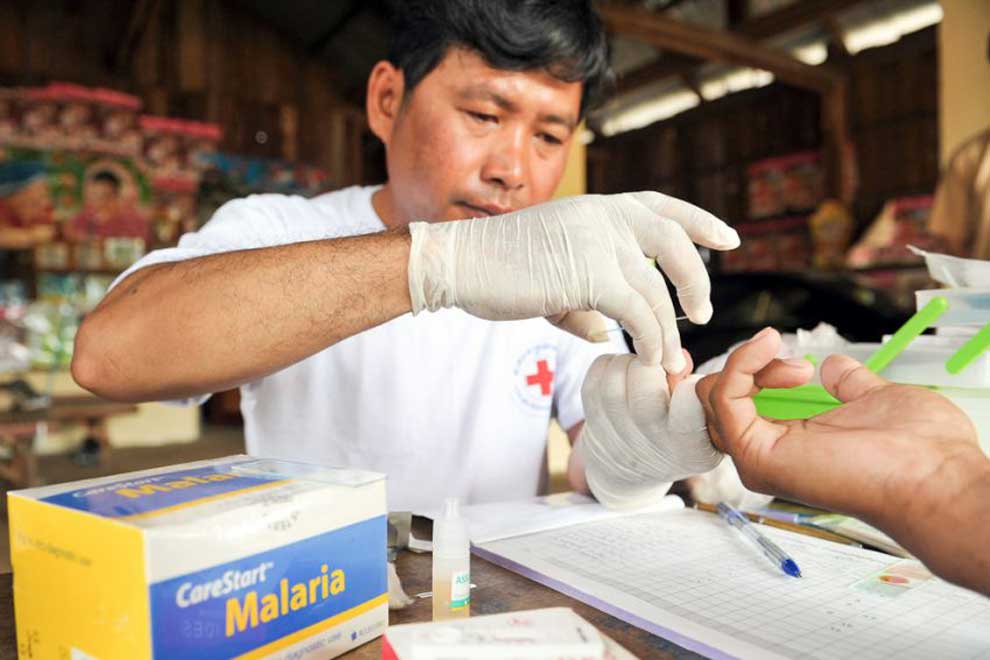
A health worker takes a sample of blood from a patient for a malaria test at his home in Pailin province in 2012. Tang Chhin Sothy/AFP
High failure rates of the frontline medication to treat malaria in Southern Vietnam have revived concerns that parasites resistant to multiple drugs, first observed in Cambodia’s Pailin province, may be spreading. Meanwhile, experts in the Kingdom are currently testing alternative treatment options to stay ahead of resistance.
A letter to be published in the October issue of medical journal The Lancet, but released online last week, said that dihydroartemisinin-piperaquine (DHA-PIP) – the drug of choice for treatment – was found to fail in nearly a quarter of cases at a surveillance site in Binh Phuoc, Vietnam. The malaria parasites discovered bear the same genetic identity as those first found in Pailin nearly a decade ago, which have since spread to eastern Thailand and southern Laos.
“The evolution and subsequent transnational spread of this . . . multidrug-resistant malaria parasite lineage is of international concern,” the letter reads.
World Health Organization Malaria Programme head Luciano Tuseo called the development “worrying” but not surprising. “It was expected,” he wrote in an email, adding that “resistance can spread, [and] can appear everywhere and anytime”.
Pasteur Institute researcher Dr Benoit Witkowski said that it is not certain that the parasites spread from Cambodia – rather than evolving independently in Vietnam – but that the former is a more likely hypothesis.
“It’s the same type of mutation and the same phenotype [observable characteristics],” he said.
“It’s alarming because it means resistance is [either] mobile or may appear elsewhere [on its own].”
DHA-PIP, Vietnam’s national frontline drug, was the drug of choice in Cambodia until 2016 when it was replaced by Artesunate Mefloquine (ASMQ) after resistance developed. Both ASMQ and DHA-PIP are known as artemisinin combination therapies (ACTs), a drug cocktail involving one part artemisinin and a secondary component.
The WHO’s Tuseo confirmed that so far ASMQ has been completely effective in cases observed at various “sentinel sites” throughout the country, however the development of resistance is only a matter of time.
“The situation in Cambodia is exactly the same as the end of last year,” he wrote.
Inquiries to Dr Huy Rekol, director of Cambodia’s National Center for Parasitology, Entomology and Malaria Control, went unanswered.
Cambodia has long been the spawning ground for drug-resistant malaria parasites, with over a half-dozen treatments deployed and then discontinued since the 1950s, as scientists race to stay ahead of mutations.
Elimination efforts in Southeast Asia are in part motivated by the memory of chloroquine resistance’s spread to Africa, causing millions of deaths in the 1980s.
The WHO in Cambodia had been testing the effectiveness of another ACT, Artesunate Amodiaquine (ASAQ), as a potential replacement for ASMQ. However, molecular analysis earlier this year confirmed resistance to the drug, Tuseo wrote.
“We expected the failure of [ASAQ] but we wanted to test the level of efficiency,” he said.
Since July, the organisation has been testing yet another ACT, Pyronaridine-Artesunate.
A study conducted in 2014-2015 of its efficacy in Cambodia found it “was below the World Health Organization recommended threshold” for frontline treatment. Tuseo said there were “doubts” about those results, however, and a deeper study is underway from which “better” results are expected.
According to Pasteur Insitute’s Witkowski, those previously unsatisfactory results may have been due to issues unrelated to resistance, such as dosage or other factors. “This needs be answered,” he said.
Another option that is on the table is to bring back DHA-PIP and rotate it with ASMQ, because parasites that become resistant to one drug appear to lose resistance to the other.
Izaskun Gaviria, a senior portfolio manager with the Global Fund’s Regional Artemisinin-resistance Intiative, said the organisation is indeed concerned about resistance spreading to Africa.
“However, we are confident that the current efforts toward malaria elimination in the Greater Mekong sub-region have significantly reduced the risk,” she wrote.
Contact PhnomPenh Post for full article
Post Media Co LtdThe Elements Condominium, Level 7
Hun Sen Boulevard
Phum Tuol Roka III
Sangkat Chak Angre Krom, Khan Meanchey
12353 Phnom Penh
Cambodia
Telegram: 092 555 741
Email: [email protected]





